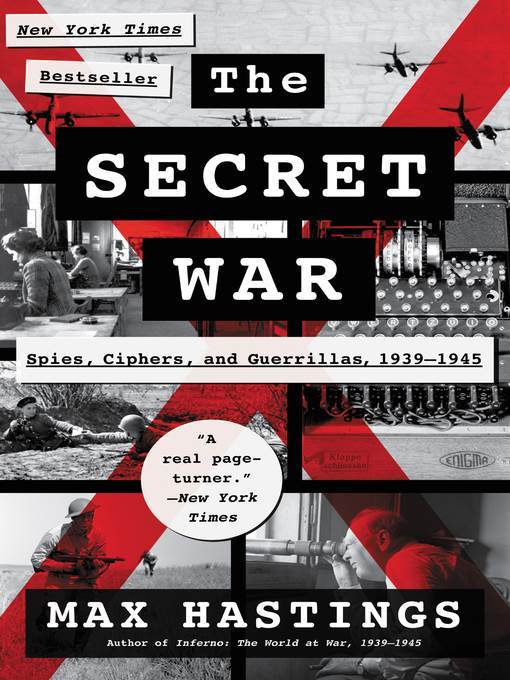
The Secret War
Spies, Ciphers, and Guerrillas, 1939-1945
کتاب های مرتبط
- اطلاعات
- نقد و بررسی
- دیدگاه کاربران
نقد و بررسی

May 23, 2016
Hastings (Catastrophe: 1914) further solidifies his gift for combining scholarship and readability in this scintillating overview of intelligence operations in WWII. He moves through the large, highly specialized body of knowledge to share the whole story: machines and code books, agents and double agents, deceptions and illusions. Combining chronological and thematic approaches, Hastings makes a strong case that "it is impossible justly to attribute all credit for the success or blame for the failure of an operation to any single factor." Even the vaunted ULTRA system was part of a structure dependent on human skill, judgment, and intuition. Stalin's discounting of the barking "dogs in the night"âthe stream of accurate intelligence on Germany's intentions in 1941âbrought the U.S.S.R. to the brink of catastrophe. In contrast, the U.S. victory at Midway owed much to Adm. Chester Nimitz accepting the word of radio intelligence that, still in its early stages, was "practically the only source" of reports in the Central Pacific. Hastings takes readers behind the lines with Britain's Special Operations Executive and describes parallel missions in such neutral states as Ireland and Portugal. He also provides character sketches of a number of clandestine agents. Hastings tells it all in a book everyone interested in WWII should acquire.

Starred review from March 1, 2016
Taking a break with Catastrophe: 1914 (2013), veteran military historian Hastings returns to World War II with the usual entirely satisfying results. There are plenty of excellent accounts of the war's espionage, codebreaking, and secret operations. Hastings mentions authors, including Stephen Budiansky and David Kahn, and warns that he will cover the same ground, adding that many popular histories and almost all memoirs and even official reports from the participants are largely fiction--including the recent acclaimed film about Alan Turing, The Imitation Game. The Red Army defeated Germany with modest help from the Allied Army, which, across the world, defeated Japan. Hastings disparages writers who describe a secret activity that turned the tide, but few readers will be able to resist his version of events. Hitler and Stalin scorned Britain's armies, but, influenced by the work of Rudyard Kipling, Somerset Maugham, and John Buchan, they "viewed its spies with extravagant respect, indeed cherished a belief in their omniscience" that was entirely undeserved. Money was no object in Soviet espionage. Agents penetrated the Nazi high command and all Allied government, sending back an avalanche of information that was routinely ignored. Obsessed with finding conspiracies, the paranoid Stalin distrusted everyone, foreigners most of all, and rejected findings that contradicted his beliefs. Allied codebreakers deserve the praise lavished on them, but Hastings points out that the German codebreakers were no slouches. While Bletchley Park broke enemy naval codes intermittently, Germany read British naval codes throughout the war. Hastings has little quarrel with historians who agree that resistance fighters did more to promote postwar self-respect of occupied nations than hasten Allied victory. As he notes in closing, in the digital age, "the importance to national security of intelligence, eavesdropping, codebreaking and counter-insurgency has never been greater." A masterful account of wartime skulduggery that has relevance still today.
COPYRIGHT(2016) Kirkus Reviews, ALL RIGHTS RESERVED.

March 1, 2016
Some books are like spies in that it is often necessary to peel back layers to reveal their true intent. This latest work from Hastings (Catastrophe 1914; All Hell Let Loose) falls within this realm, paying homage to World War II intelligence agencies. Uncovering complex information, the text reveals three narrative themes: mere intelligence did not win the war, democracies were more advantageously attuned to their agencies' output, and that Germany, Japan, and Russia ignored insights that conflicted with their interests, leading to consequences on the battlefield. This dense and occasionally cumbersome work is not a chronology of events; instead the author provides readers with a thorough understanding of how intelligence operated during the conflict. Hastings' narrative fits nicely with titles such as Christof Mauch's The Shadow War Against Hitler, Nigel West and Oleg Tsarev's TRIPLEX, and David Kahn's Hitler's Spies. VERDICT Recommended for World War II and spy enthusiasts as well as those who desire an informative historical read.--Jacob Sherman, John Peace Lib., Univ. of Texas at San Antonio
Copyright 2016 Library Journal, LLC Used with permission.

























دیدگاه کاربران